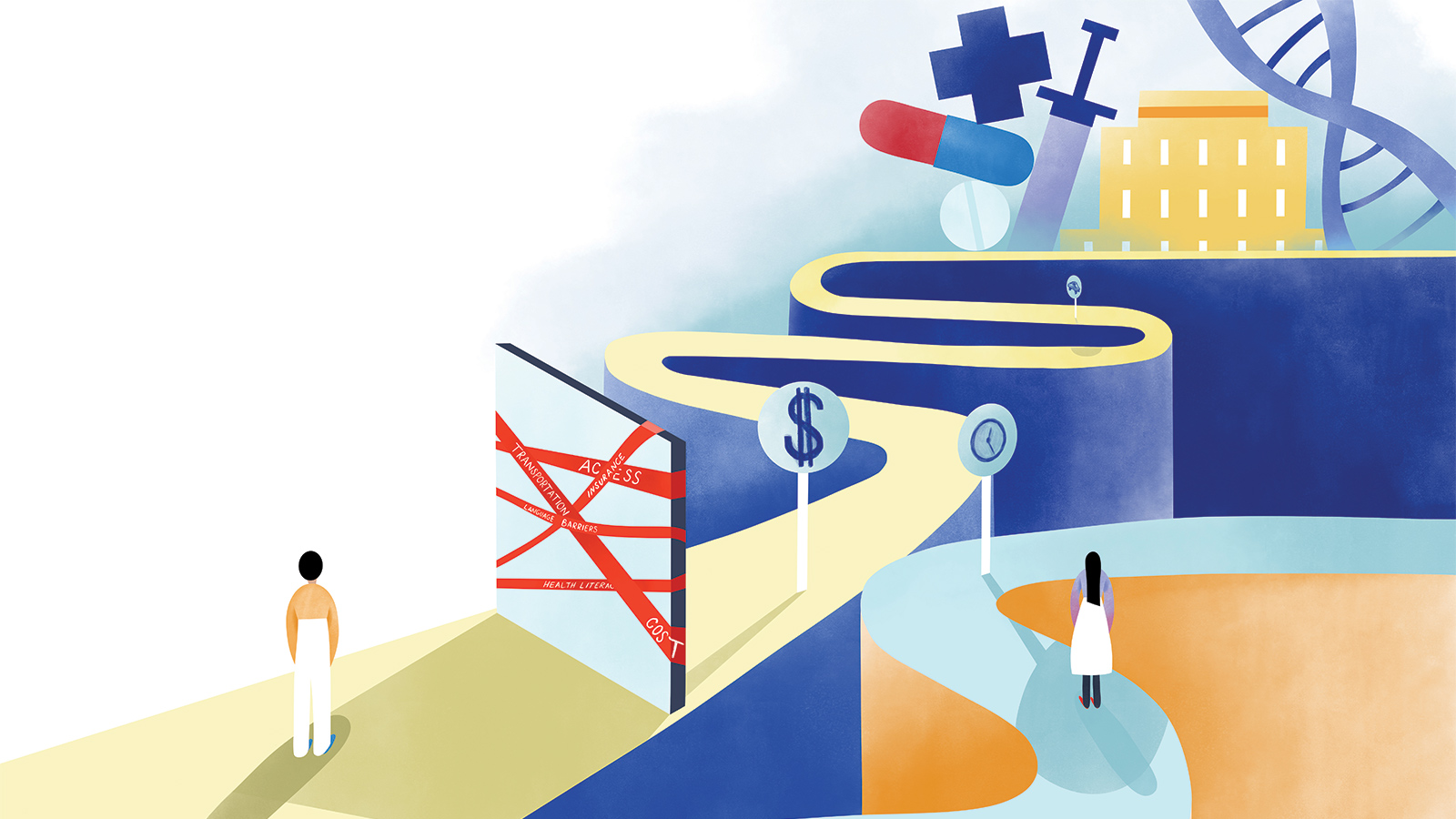By Anissa Gabbara | Art by Adam Beeman | Photos by School of Nursing, Erica Bass for Michigan Medicine, Center for Global Health Equity
Health is a basic human right—unequivocally. But what happens when a healthy life is hindered by a slew of challenges?
It’s a question that far too many individuals are forced to confront. According to a 2023 report from the Commonwealth Fund, the U.S. spends more money on health care than any other high-income country, yet it has the shortest life expectancy at birth and the highest rates of multiple chronic diseases. And the National Academies of Sciences, Engineering, and Medicine report that in low- and middle-income countries, poor-quality care is responsible for 15% of overall deaths.
“One of the things that's very clear to us is that the way we currently give health care is not going to be able to meet the needs of our population now or in the future—unless we reorient it,” said Patricia D. Hurn, dean of the School of Nursing.
A shift in focus
A host of threats to health are plaguing our communities: racial and socioeconomic disparities in accessibility and affordability, outbreaks of infectious disease, deteriorating air quality due to climate change, and gun violence.
U‑M sees an opportunity to make a lasting impact in this space, but not without shifting its focus.
“The future of health care has to have a strong focus on prevention, and prevention is not an easy thing,” said Marschall Runge, U‑M executive vice president for medical affairs, chief executive officer of Michigan Medicine, and dean of the Medical School.
Hurn added: “You can't help people orient themselves around prevention if, in fact, they don't have the understanding and the knowledge and the access to do it.
So that's the problem. And why is it important now and what has that got to do with Michigan?”
Gaining ground
Finding solutions to these challenges is a priority for U‑M. Whether it’s leveraging transformational new therapies to improve patient outcomes or nipping an emergent disease in the bud—U‑M has big plans to transform patients’ lives through accessible, affordable, and quality health care.
Expanding women's health care is just one way U‑M is taking action.
“One of the most critical issues in women's health in under-resourced communities is not getting screenings,” Runge noted. “So we put together a mobile mammography unit that goes to Ypsilanti and the surrounding area to ensure that women aren’t missing their annual screenings.”
Through the faculty practice led by April Bigelow, a clinical associate professor at the School of Nursing, the university can better provide palliative care to patients with severe disease.
“Our hospitals are not really designed to be compassionate centers, and palliative care is a discipline that nursing has been leading for a long time,” Hurn said. “This is something that we've ignored in health care for too long, and it's something that must be a priority now.”
And through the health system’s newest member, UM Health-Sparrow, the university intends to bring state-of-the-art mental health services to mid-Michigan. A behavioral health facility is being planned for the Lansing campus to provide services to address one of the country’s most widespread health issues.
“The state doesn't have nearly enough mental health facilities, so this is a big, bold move,” Runge said.
The heightened need for behavioral and mental health resources among students in recent years is a crisis in itself. By establishing the Well-being Collective and the Eisenberg Family Depression Center, and joining JED Campus, a four-year initiative to improve well-being and mental health work on campus, U‑M is prioritizing the mental health of students, faculty, staff, and the community. And with a commitment to increasing arts engagement on campus, the university recognizes the arts as a way to improve not only well-being, but overall health outcomes.
“For well-being to occur, we must have the arts in our life,” Hurn said. “Engaging patients and populations of people at all different stages in health, in a variety of creative endeavors makes them well, makes them more successful in handling chronic diseases, and, in general, connects their lives in ways that you can't do otherwise.”
A concerted effort
Whether it’s harnessing big data and artificial intelligence to advance preventive care and health systems or fostering innovative research to influence policy and practice, U‑M’s collaborative nature makes it uniquely positioned to tackle the biggest issues in health and well-being while streamlining the way it delivers care.
“Every school on campus has the potential to make an important contribution to improving human health. And that's why the collaborative culture of the University of Michigan and the collaborative focus of the Look to Michigan campaign is so well suited to play to those strengths,” said John Ayanian, director of the U‑M Institute for Healthcare Policy and Innovation (IHPI).
The largest university-based community of health services researchers in the nation, IHPI consists of more than 700 faculty across the Ann Arbor, Flint, and Dearborn campuses, working together to improve quality, affordable health care and equitable access to it.
“How can we communicate the work we're doing here at the University of Michigan and partner with others outside of the university to be sure that the research and training that we're providing is meeting the needs of the broader society? The role of data science and artificial intelligence has been, and will continue to be, pivotal in that work,” Ayanian said.
Additionally, the Center for Global Health Equity (CGHE) brings together U‑M faculty, staff, and students to confront barriers to global health equity, creating opportunities to work with partners in low- and middle-income countries around the world.
“We are developing collaborative research programs with colleagues in Kenya and Ghana to help them advance important research that they're defining and leading with support from us here at the University of Michigan,” Ayanian said.
This collaborative culture is also being leveraged at the School of Public Health (SPH) through the Public Health IDEAS (Interdisciplinary Discovery, Engagement + Actions for Society) initiative, which catalyzes interdisciplinary research in four critical areas where it strives to make an impact: creating healthy cities, preventing firearm injuries, combating infectious diseases, and building health equity.
“The Public Health IDEAS initiative is expanding and accelerating our collaborative work with colleagues across campus to advance breakthroughs and discoveries,” said F. DuBois Bowman (MS ’95), SPH dean and Roderick Joseph Little Collegiate Professor of Public Health. “We have an abundance of talented colleagues across the university who care deeply about these issues and have important expertise to share.”
It’s about the people
As U‑M works to transform health and well-being, putting people at the heart of its efforts is paramount. To do this, facing up to persistent inequities in the nation’s health care system is crucial.
For instance, women of color have a disproportionately higher risk of childbirth complications and tend to receive lower-quality maternity care than other women. In an effort to promote health equity and diversify the midwifery profession, the School of Nursing recently partnered with Birth Detroit to launch the Michigan Maternity Care Traineeship Program.
And SPH has teamed up with the American Heart Association, the American Diabetes Association, and the American Cancer Society for a Bank of America-funded initiative to help improve health outcomes for communities of color.
“The initiative focuses on the leading causes of death in communities of color—heart disease, cancer, stroke, and diabetes—and improving health outcomes more broadly, including maternal health, nutrition, and mental wellness,” Bowman said.
Turning a battleship
Considering the magnitude of challenges, improving health and well-being will require sustained effort and focus. But donors have never failed U‑M in making things happen.
“It's going to take a lot of innovation. It's going to take a lot of different ways to educate people. It's going to have to turn a battleship around, and that’s a very slow and very expensive process,” Hurn said. “We need a great deal of support from our donors to be able to make a dent in this problem.”
And when it comes to preparing U‑M students—our future leaders—this support has never been more critical.
“Philanthropy not only enables us to attract the best students…but it also allows U‑M students to focus on what they came to our university to do,” Bowman said. “The gifts we receive to fund scholarships, fellowships, and other forms of student aid help us to support and train scholars, researchers, and professionals who will go on to create a healthier and more equitable world for all.”








